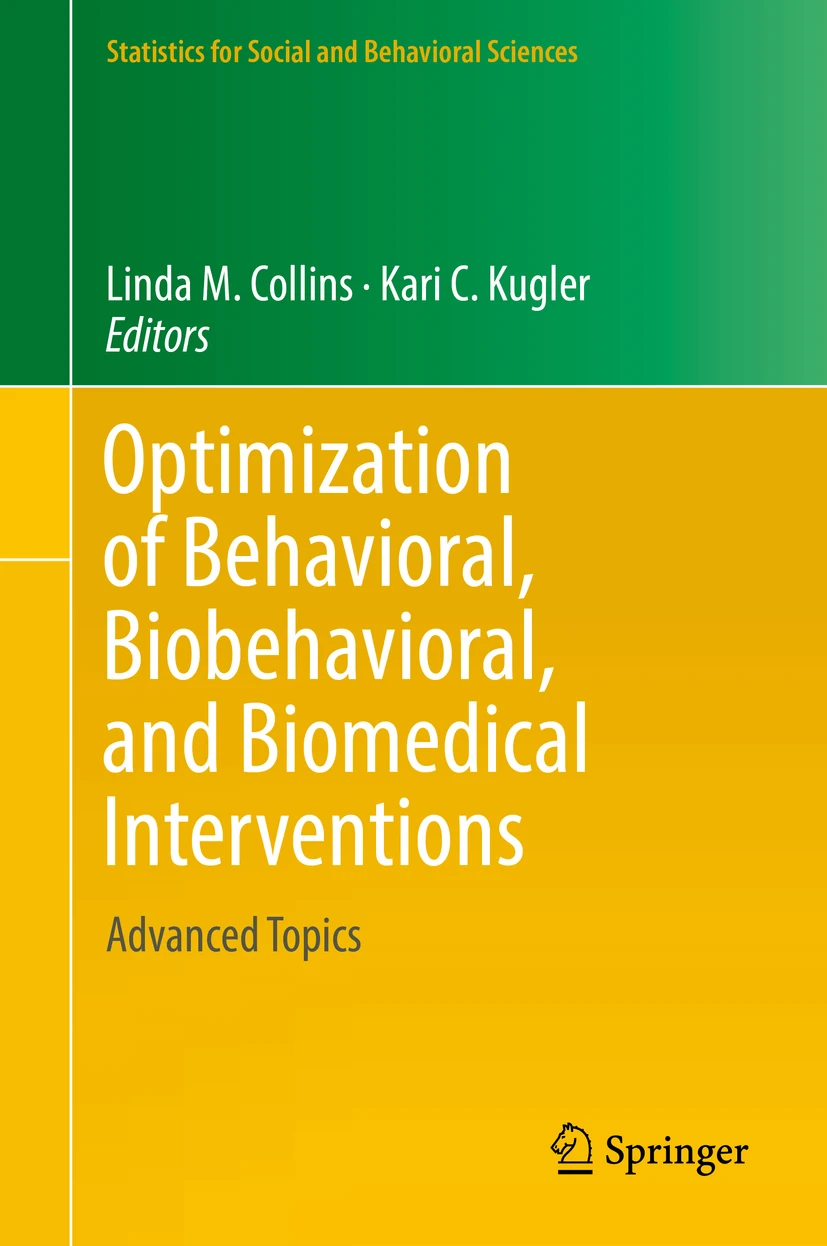
Intervention Optimization: A Paradigm Shift and Its Potential Implications for Clinical Psychology
Collins, L. M., Nahum-Shani, I., Guastaferro, K., Strayhorn, J. C., Vanness, D. J., & Murphy, S. A. (2024). Intervention Optimization: A Paradigm Shift and Its Potential Implications for Clinical Psychology. In Annual Review of Clinical Psychology (Vol. 20, Issue Volume 20, 2024, pp. 21–47). Annual Reviews. Link
The Multiphase Optimization Strategy (MOST)
Collins, L.M. (2018). Optimization of behavioral, biobehavioral, and biomedical interventions: The multiphase optimization strategy (MOST). New York: Springer. Link
Advanced Topics
Collins, L.M., & Kugler, K.C. (2018). Optimization of behavioral, biobehavioral, and biomedical interventions: Advanced topics. New York: Springer. Link
Further Recommended Reading
Preface and Chapter 1 in Collins, L.M. (2018). Optimization of behavioral, biobehavioral, and biomedical interventions: The multiphase optimization strategy (MOST). New York: Springer.
Collins, L. M., Kugler, K. C., & Gwadz, M. V. (2015). Optimization of multicomponent behavioral and biobehavioral interventions for the prevention and treatment of HIV/AIDS. Aids and Behavior, Supp 1, 197-214. Link
Guastaferro, K., & Collins, L. M. (2019). Achieving the goals of translational science in public health intervention research: The multiphase optimization strategy (MOST). American Journal of Public Health, 109, S128-S129. Link
These articles describe the thinking behind some implementations of MOST or related approaches in field settings. These examples all describe factorial optimization trials, although other experimental designs are often used for optimization trials.
Baker, T. B., Collins, L. M., Mermelstein, R., Piper, M. E., Schlam, T. R., Cook, J. W., et al. (2016). Enhancing the effectiveness of smoking treatment research: conceptual bases and progress. Addiction, 111(1)., 107-16. doi:10.1111/add.13154 Link
Bernstein, S.L., Dziura, J., Weiss, J., Miller, T., Vickerman, K.A., Grau, L.E., Pantalon, M.V., Abroms, L., Collins, L.M., & Toll, B. (2018). Tobacco dependence treatment in the emergency department: A randomized trial using the multiphase optimization strategy. Contemporary Clinical Trials, 66, 1-8. Link
Celano, C.M., Albanese, A., Millstein, R.A., Mastromauro, C.A., Chung, W.-J., Legler, S., Park, E.R, Healy, B.C., Collins, L.M., Januzzi, J.L., & Huffman, J.C. (2018). Optimizing a positive psychology intervention to promote health behaviors following an acute coronary syndrome: The Positive Emotions after Acute Coronary Events-III (PEACE-III) randomized factorial trial. Psychosomatic Medicine, 80, 526-534. Link
Cook, J. W., Collins, L. M., Fiore, M. C., Smith, S. S., Fraser, D., Bolt, D. M., et al. (2016). Comparative effectiveness of motivation phase intervention components for use with smokers unwilling to quit: a factorial screening experiment. Addiction, 111(1)., 117-28. doi:10.1111/add.13161 Link
Gwadz, M.V., Collins, L.M., Cleland, C.M., Leonard, N.R., Wilton, L., Gandhi, M., Braithwaite, R.S., Perlman, D.C., Kutnick, A., & Ritchie, A.S. (2017). Using the multiphase optimization strategy (MOST) to optimize an HIV care continuum intervention for vulnerable populations: A study protocol. BMC Public Health, 17, 383. Link
Kugler, K. C., Wyrick, D. L., Tanner, A. E., Milroy, J. J., Chambers, B., Ma, A., Guastaferro, K. M., and Collins L. M. (2018). Using the multiphase optimization strategy (MOST) to develop an optimized online STI preventive intervention aimed at college students: Description of conceptual model and iterative approach to optimization. In Collins, L. M., & Kugler, K. C. Optimization of behavioral, biobehavioral, and biomedical interventions: Advanced topics. New York: Springer, pp. 1—21.
McClure, J. B., Derry, H., Riggs, K. R., Westbrook, E. W., St. John, J., Shortreed, S. M., Bogart, A., & An, L. C. (2012). Questions about quitting (Q(2)): Design and methods of a Multiphase Optimization Strategy (MOST) randomized screening experiment for an online, motivational smoking cessation intervention. Contemporary Clinical Trials, 33(5), 1094-1102. Link
Pellegrini, C.A., Hoffman, S.A., Collins, L.M., & Spring, B. (2014). Optimization of remotely delivered intensive lifestyle treatment for obesity using the multiphase optimization strategy: Opt-IN study protocol. Contemporary Clinical Trials, 38, 251-259. NOTE: See important corrigendum: Pellegrini, C.A., Hoffman, S.A., Collins, L.M., & Spring, B. (2015). Corrigendum to “Optimization of remotely delivered intensive lifestyle treatment for obesity using the multiphase optimization strategy: Opt-IN study protocol.” Contemporary Clinical Trials, 45, 468-469. Link
Piper, M. E., Fiore, M. C., Smith, S. S., Fraser, D., Bolt, D. M., Collins, L. M., et al. (2016). Identifying effective intervention components for smoking cessation: a factorial screening experiment. Addiction, 111(1)., 129-41. doi:10.1111/add.13162 Link
Schlam, T. R., Fiore, M. C., Smith, S. S., Fraser, D., Bolt, D. M., Collins, L. M., et al. 2016). Comparative effectiveness of intervention components for producing long-term abstinence from smoking: a factorial screening experiment. Addiction, 111(1)., 142-55. doi:10.1111/add.13153 Link
Spring, B., Pfamatter, A.F., Marchese, S.H., Stump, T., Pellegrini, C., McFadden, G., Hedeker, D., Siddique, J., Jordan, N., & Collins, L.M. (2020). A factorial experiment to optimize remotely delivered behavioral treatment for obesity: Results of the Opt-In study. Obesity, 28, 1652-1662. doi: 10.1002/oby.22915 Link
Tanner, A.E., Guastaferro, K.M., Rulison, K., Wyrick, D.L., Milroy, J.M., Bhandari, S., Thorpe, S.Y., Ware, S., Miller, A.M., & Collins, L.M. (In press). A hybrid evaluation-optimization trial to evaluate an intervention targeting the intersection of alcohol and sex in college students and simultaneously test an additional component aimed at preventing sexual violence. Annals of Behavioral Medicine.
Watkins, E., Newbold, A., Tester-Jones, M., Javaid, M., Cadman, J., Collins, L.M., Graham, J., & Mostazir, M. (2016). Implementing multifactorial psychotherapy research in online virtual environments (IMPROVE-2): Study protocol for a phase III trial of the MOST randomized component selection methods for internet cognitive-behavioural therapy for depression. BMC Psychiatry, 16, 345. Link
Wyrick, D.L., Tanner, A.E., Milroy, J., Guastaferro, K.M., Bhandari, S., Kugler, K.C., Thorpe, S., Ware, S., Miller, A., & Collins, L.M. (2020). itMatters: Optimization of an online intervention to prevent sexually transmitted infections in college students. Journal of American College Health. doi: 10.1080/07448481.2020.1790571. Link
These articles review practical aspects of experimental design relevant to intervention science and attempt to correct some pervasively held misconceptions. These articles and may be useful as citations.
Collins, L.M. (2018). Chapter 3 in Optimization of behavioral, biobehavioral, and biomedical interventions: The multiphase optimization strategy (MOST). New York: Springer. Link
Collins, L.M., Dziak, J.J., Kugler, K.C., & Trail, J.B. (2014). Factorial experiments: Efficient tools for evaluation of intervention components. American Journal of Preventive Medicine, 47, 498-504. Link
Collins, L. M., Dziak, J. J., & Li, R. (2009). Design of experiments with multiple independent variables: A resource management perspective on complete and reduced factorial designs. Psychological Methods, 14(3), 202-224. Link
Green, S. M. C., Smith, S. G., Collins, L. M., & Strayhorn, J. C. (2024). Decision-making in the multiphase optimization strategy: Applying decision analysis for intervention value efficiency to optimize an information leaflet to promote key antecedents of medication adherence. Translational Behavioral Medicine, ibae029. Link
Strayhorn, J. C., Cleland, C. M., Vanness, D. J., Wilton, L., Gwadz, M., & Collins, L. M. (2024). Using decision analysis for intervention value efficiency to select optimized interventions in the multiphase optimization strategy. Health psychology, 43(2), 89–100. Link
Strayhorn, J. C., Collins, L. M., & Vanness, D. J. (2023). A posterior expected value approach to decision-making in the multiphase optimization strategy for intervention science. Psychological methods, 10.1037/met0000569. Advance online publication. Link
Chakraborty, B., Collins, L. M., Strecher, V., & Murphy, S. A. (2009). Developing multicomponent interventions using fractional factorial designs. Statistics in Medicine, 28, 2687-2708. Link
Dziak, J. J., Nahum-Shani, I., & Collins, L. M. (2012). Multilevel factorial experiments for developing behavioral interventions: Power, sample size, and resource considerations. Psychological Methods, 17, 153. Link
Nair, V., Strecher, V., Fagerlin, A., Ubel, P., Resnicow, K., Murphy, S. A., Little, R., Chakraborty, B., & Zhang, A. (2008). Screening experiments and the use of fractional factorial designs in behavioral intervention research. American Journal of Public Health,98, 1354-1359. Link
Collins, L.M., Murphy, S.A., & Bierman, K. (2004). A conceptual framework for adaptive preventive interventions. Prevention Science, 3, 185-196. Link
Nahum-Shani, I., Smith, S. N., Spring, B.J., Collins, L.M., Witkiewitz, K., Tewari, A., & Murphy, S. A. (2018). Just–in-time adaptive interventions (JITAIs) in mobile health: Key components and design principles for ongoing health behavior support. Annals of Behavioral Medicine, 52, 446-452. Link
Riley, W. T., Serrano, K. J., Nilsen, W., & Atienza, A. A. (2015). Mobile and wireless technologies in health behavior and the potential for intensively adaptive interventions. Current Opinion in Psychology, 5, 67–71. Link
Almirall, D., Nahum-Shani, I., Wang, L., & Kasari, C. (2018). Experimental designs for research on adaptive interventions: Singly and sequentially randomized trials. In Collins, L. M., & Kugler, K. C. Optimization of behavioral, biobehavioral, and biomedical interventions: Advanced topics. New York: Springer, pp. 89—120. Link
Collins, L. M., Nahum-Shani, I., & Almirall, D. (2014). Optimization of behavioral dynamic treatment regimens based on the sequential, multiple assignment, randomized trial (SMART). Clinical Trials, 11, 426-434. Link
Dong, Y., Rivera D.E., Downs, D.S., Savage, J.S., Thomas, D.M., & Collins, L.M. (2013). Hybrid model predictive control for optimizing gestational weight gain behavioral interventions. Proceedings from the 2013 American Control Conference. 1970-1975. Link
Klasnja, P., Hekler, E. B., Shiffman, S., Boruvka, A., Almirall, D., Tewari, A., & Murphy, S. A. (2015). Microrandomized trials: An experimental design for developing just-in-time adaptive interventions. Health Psychology, 34(S), 1220. Link
Rivera, D. E., Hekler, E. B., Savage, J. S., and Symons Downs D. (2018). Intensively adaptive interventions using control systems engineering: Two illustrative examples. In Collins, L. M., & Kugler, K. C. Optimization of behavioral, biobehavioral, and biomedical interventions: Advanced topics. New York: Springer, pp. 89—120.
Timms, K.P., Rivera, D.E., Collins, L.M., & Piper, M.E. (2014). Continuous-time system identification of a smoking cessation intervention. International Journal of Control, 87, 1423-1437. Link
Timms, K. P., Rivera, D. E., Collins, L. M., & Piper, M. E. (2013). A dynamical systems approach to understand self-regulation in smoking cessation behavior change. Nicotine and Tobacco Research, 16, S159-168. Link
Gallis, J. A., Bennett, G. G., Steinberg, D. M., Askew, S., & Turner, E. L. (2019). Randomization procedures for multicomponent behavioral intervention factorial trials in the multiphase optimization strategy framework: challenges and recommendations. Translational Behavioral Medicine, 9(6), 1047-1056. Link
Huffman, J.C., Millstein, R.A., Celano, C.M., Healy, B.C., Park, E.R., & Collins, L.M. (2020). Developing a psychological-behavioral intervention in cardiac patients using the multiphase optimization strategy: Lessons learned from the field. Annals of Behavioral Medicine, 54, 151-163.Link
Piper, M. E., Schlam, T. R., Fraser, D., Oguss, M., & Cook, J. W. (2018). Implementing factorial experiments in real-world settings: Lessons learned while engineering an optimized smoking cessation treatment. In Collins, L. M., & Kugler, K. C. Optimization of behavioral, biobehavioral, and biomedical interventions: Advanced topics. New York: Springer, pp. 23—45.
Wyrick, D.L., Rulison, K.L., Fearnow-Kenney, M., Milroy, J.J., & Collins, L.M. (2014). Moving beyond the treatment package approach to developing behavioral interventions: Addressing questions that arose during an application of the multiphase optimization strategy (MOST). Translational Behavioral Medicine, 4, 252-259. Link
Further Learning
Whether you are looking for additional support as you prepare a grant proposal involving MOST or practical information helpful in managing your optimization trial, this section provides resources for a deeper dive into intervention optimization.
REDCap with Most
The goal of this manual is to show how one might setup a REDCap project to support a research study with multiple conditions, such as factorial experiments common in the Multiphase Optimization Strategy (MOST) framework.
Establishing a conceptual model and understanding optimization
Sometimes the conceptual model is not a model of a health behavior per se, but a model of maintaining treatment fidelity, promoting adherence or compliance, or the like. The conceptual model is explained in more...
Common misconceptions about factorial experiments
A factorial experiment is essentially an RCT with a lot of experimental conditions, and therefore is extremely difficult to power.
Informal introduction to factorial experimental designs
The purpose of this page is to clarify some concepts, notation, and terminology related to factorial experimental designs, and to compare and contrast factorial experiments to randomized controlled trials (RCTs). A more in-depth introduction can...
LET’S STAY IN TOUCH
Join the CADIO Mailing List
Keep up to date with the latest news, events, online courses, and resources from CADIO.

